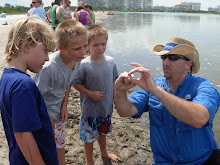 On Thursday and Friday, I had the privilege of being a guest instructor for the Florida Natural Resource Leadership Institute session in Ft. Myers. To give you some background, the Florida Natural Resources Leadership Institute (NRLI) is an eight month-long leadership training program offered through the University of Florida Extension Service that helps the people, industries, and agencies of Florida collaborate in achieving the often conflicting goals of protecting the environment and fostering economic development. NRLI helps rising leaders develop skills to build consensus around contentious environmental issues and move beyond conflict to find solutions. Through eight three-day sessions and a practicum exercise, NRLI Fellows gain knowledge of Florida natural resource issues, leadership skills, professional networking opportunities, and personal and social growth.
On Thursday and Friday, I had the privilege of being a guest instructor for the Florida Natural Resource Leadership Institute session in Ft. Myers. To give you some background, the Florida Natural Resources Leadership Institute (NRLI) is an eight month-long leadership training program offered through the University of Florida Extension Service that helps the people, industries, and agencies of Florida collaborate in achieving the often conflicting goals of protecting the environment and fostering economic development. NRLI helps rising leaders develop skills to build consensus around contentious environmental issues and move beyond conflict to find solutions. Through eight three-day sessions and a practicum exercise, NRLI Fellows gain knowledge of Florida natural resource issues, leadership skills, professional networking opportunities, and personal and social growth. The issue addressed in Ft. Myers was balancing coastal resource use and protection-specifically, the establishment of non-internal combustion motor zones (or NICMZ) in submerged aquatic preserves throughout the coastal waters of Lee County.
On Thursday fellows (NRLI participants) were first given an overview by Dr. Bob Swett of Florida Sea Grant and Justin McBride of Lee County Natural Resources Division of how the decision to establish NICMZ was established. Later in the afternoon, the focus shifted to skills training. My colleague Betty Staugler, the Charlotte County Sea Grant Extension Agent, and I lead an exercise on group dynamics. Fellows also learned about proper agenda design from my colleague Joy Hazell, the Lee County Sea Grant Extension Agent (see pictures below).
Friday started off with a chilly, but wonderful boat tour (thank you Fish-Tale Marina for the use of the boat) of Estero Bay to view some of the designated NICMZ. The tide was extremely low, which made it very easy to see boat prop scar damage on exposed grass flats. Later, we also pulled a seine net to show fellows the diversity of marine life associated with seagrass communities. Unfortunately because of the cold we didn't get a lot of diversity in the net. However, we still were able to show the group some unique catches such as a batfish and sea hares.
After a wonderful lunch, fellows listened to a stakeholder panel about process to establish the NICMZ. I felt it was a great learning experience for all as we heard several different perspectives relating to the issue. If I learned anything from the panel, it's how important it is to include user groups in the process when deciding on policies that will ultimately affect these groups. Enjoy the pictures.
 |
| Dr. Bob Swett of Florida Sea Grant discusses the Regional Waterway Management System and how it is used to guide management decisions |
 |
| Justin Mcbride with the Lee County Natural Resource Division discusses dredging priority areas within the County's waters |
 |
| Joy Hazell, Lee County Sea Grant Agent chats with NRLI fellows on the importance of proper agenda design for public meetings dealing with contentious issues. |
 |
| NRLI fellows participate in "Lost In The Jungle" an activity that addresses group dynamics and behaviors |
 |
| I discuss with fellows the concepts of task and maintenance functions- 2 important components of successful group interactions |
 |
| Betty Staugler, Charlotte County Sea Grant Extension Agent talks with the NRLI fellows about the "Groan Zone", which is a normal part of group meetings. |
 |
| Beautiful Estero Bay on a sunny chilly morning |
 |
| Heather Stafford, Aquatic Preserve Manager with Florida's Department of Environmental Protection shows fellows a map of where the designated NICMZ are in Estero Bay. |
 |
| Joy, Betty, and I sporting our lovely waders as we prepare to pull as seine net through the chlly water! |
 |
| Seining in Estero Bay (we're on the north side of Lovers Key State Park) |





No comments:
Post a Comment